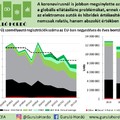How does the number of children affect revolutions and economic growth? Of demography, democracy and depression.
By István Zsoldos, Péter Simon Vargha and Diána Szőke
We tend to think about demographic processes in a very simplistic way: there are a lot of Chinese people, masses of children are born in Africa, Japan’s population is shrinking, and so on… But behind these over-generalized views, there are often surprising demographic trends to be found, which have profound implications on all aspects of life, from economic performance to political stability.
Fertility isn’t low just in Hungary…
We have been thinking a lot recently about demography and its economic and social consequences. Here are a few interesting slides from an internal presentation we held on the topic. The first one shows that the demographic transition is much more advanced than generally thought, and not just in rich countries. In countries marked red, the fertility rate is close to or below the so-called “replacement rate”, meaning the number of children per woman necessary to maintain a given population size in the long run. (Statistically, this is usually defined as 2.1 children/woman.) Light green countries are not far from this level, and there are surprising members in both groups: for example, fertility rates are far below 2 in Brazil, Iran and Thailand, which implies a population decrease over the long term. But we were also amazed to see that India’s fertility rate is just 2.5. These tendencies will completely redraw the global map – and not just over a longer time horizon. Consider this: already by 2030, Nepalis will outnumber Canadians; by then, the combined populations of Pakistan and Bangladesh will be larger than that of the US; meanwhile, there will be more people living in Tanzania alone than in the whole of Germany.
In the red - total fertility rates. Click to see interactive map. Source: UN population statistics.
The shrinking proportion of working-aged people and economic problems…
The demographic transition affects economic performance. Economic growth is typically fastest in countries where the working-age population is rapidly rising, but the number of children is already lower, while the population is not yet ageing overall. However, the decline of the working-age population later on is not a good omen for growth. This can partially explain the current crisis and different countries’ various growth trajectories prior to it. The working-age population in Hungary began to decrease already in 2003; in Slovakia, this only began in 2011. The following slide gives some more dates: red marks the start of the decline, which tends to correspond to the start of a period of economic difficulty.

Based on the above, it is easy to predict that the Chinese economy will likely slow down in the near future, since its working-age population will start to shrink from 2015 onwards. This depends, of course, on the exact definition: to highlight this problem, the national statistics office has already set this date for 2012. On the other hand, India and the Middle East can expect robust growth in the next 10 years, at least from a demographic point of view, while Latin America also has promising prospects. For those interested in this issue, and how all this affects stock and bond prices, we recommend this paper.
Too much testosterone does not bode well for democracy
Demographic composition also allows for forecasting the probability of a country being democratic and politically stable. Societies with a high rate of youngsters (particularly young men between the ages of 15-30) have a slimmer chance of being democratic, and are at greater risk of political instability. (This is becoming an increasingly prominent scientific topic: see more details here, here and here.) The reason behind this is that young men in general are more prone to taking risks, to questioning (or even overthrowing) the existing status quo, and tend to be more aggressive than the average. Based on our regression calculations, the probability of stable democracy is lower in poorer countries and oil producers as well. Using these starting assumptions, we estimated which countries we would expect to become (more) democratic by 2020 (in blue), and which are likely to inch closer to dictatorship (in red).
Countries moving towards democratization (blue) and dictatorship (red). The color shades correspond to statistical probability. Click to see interactive map.
Source: own calculations.
It’s important to point out that we used Freedom House’s 2012 scores; in fact, life has already proved our model correct in certain cases. North Africa is on the road to democratization, however rocky that path may be, whereas Mali has moved in the opposite direction. Based on our model, South East Asia, Central Asia, Iran, China and Russia may also start to democratize, however strange this may now sound. Nonetheless, China will face a “handicap” in this regard: by 2020, there will be 24 million single Chinese men, as a result of selective abortions and the Chinese state’s one-child policy. This does not necessarily bode well for political stability. India will be faced with the same challenge – albeit to a lesser degree.
 24 million single Chinese men. Source: topinbuzz.com
24 million single Chinese men. Source: topinbuzz.com
In conclusion, the demographic transition will redraw the global map, both in terms of economic power and political stability. The global outlook is not bad overall, since more countries are likely to democratize than they are to move towards dictatorship. There will also be growth hotspots – but, in the western world, only in places with imported workers, because their growth outlook is not too rosy based purely on demographic preconditions.
A bejegyzés trackback címe:
Kommentek:
A hozzászólások a vonatkozó jogszabályok értelmében felhasználói tartalomnak minősülnek, értük a szolgáltatás technikai üzemeltetője semmilyen felelősséget nem vállal, azokat nem ellenőrzi. Kifogás esetén forduljon a blog szerkesztőjéhez. Részletek a Felhasználási feltételekben és az adatvédelmi tájékoztatóban.




